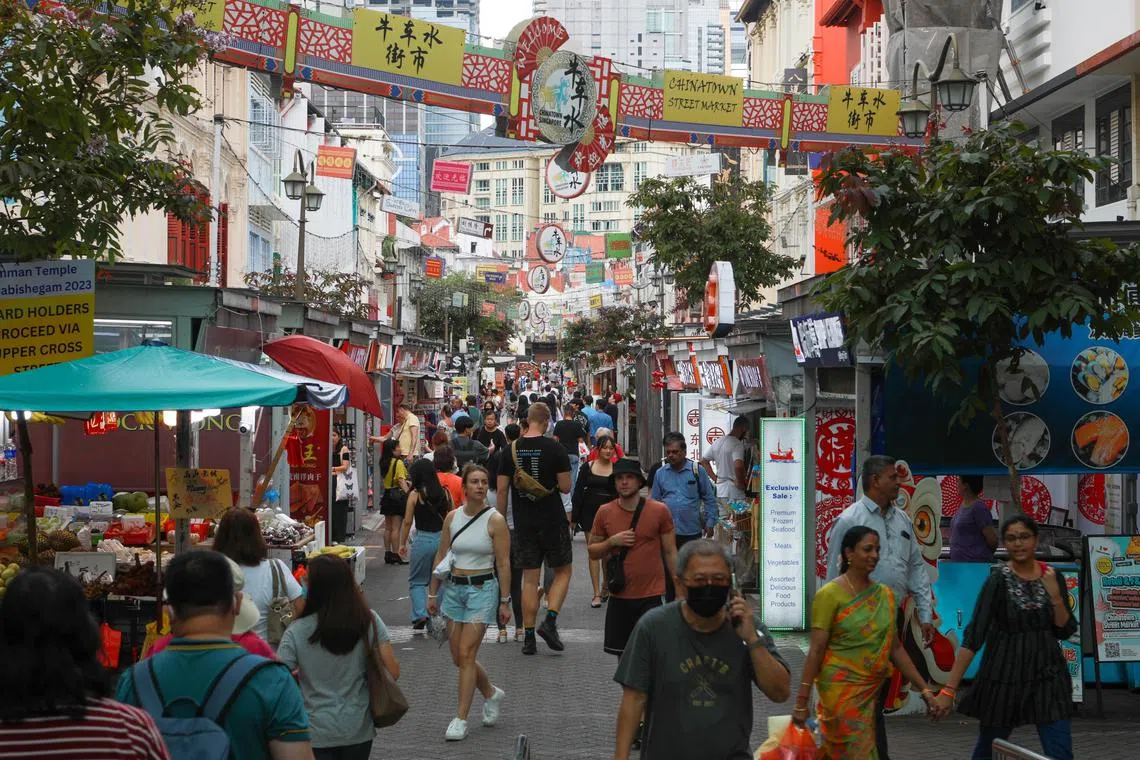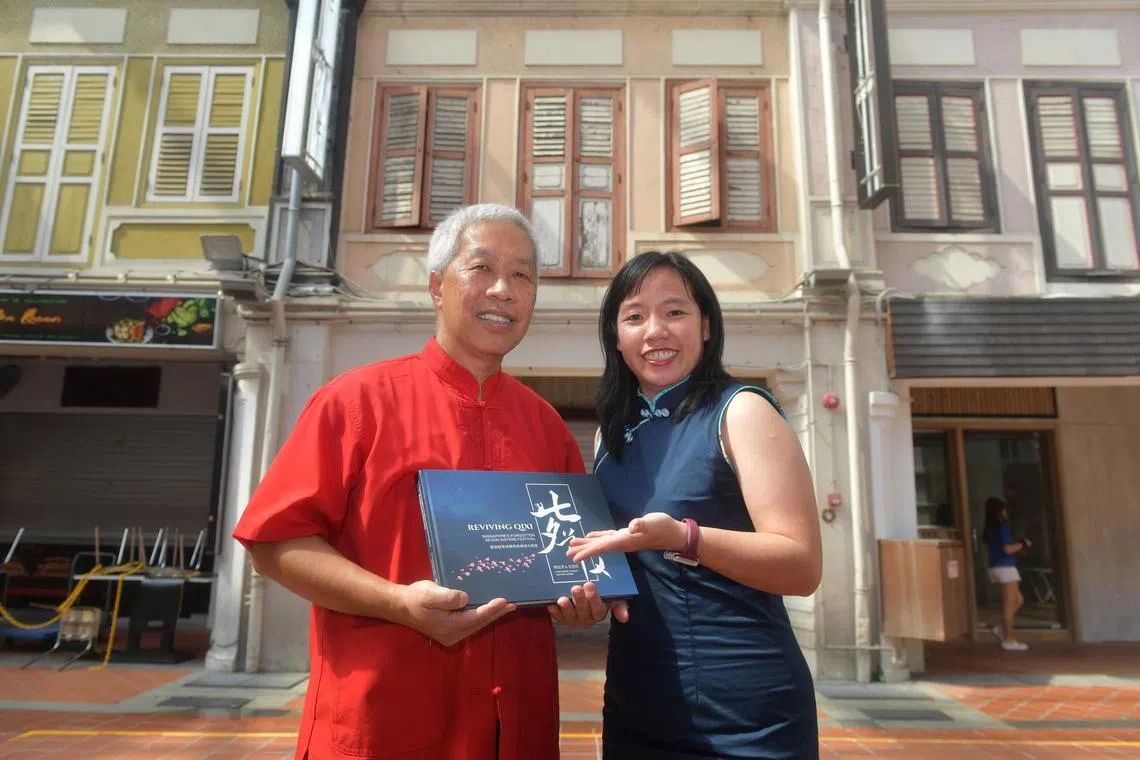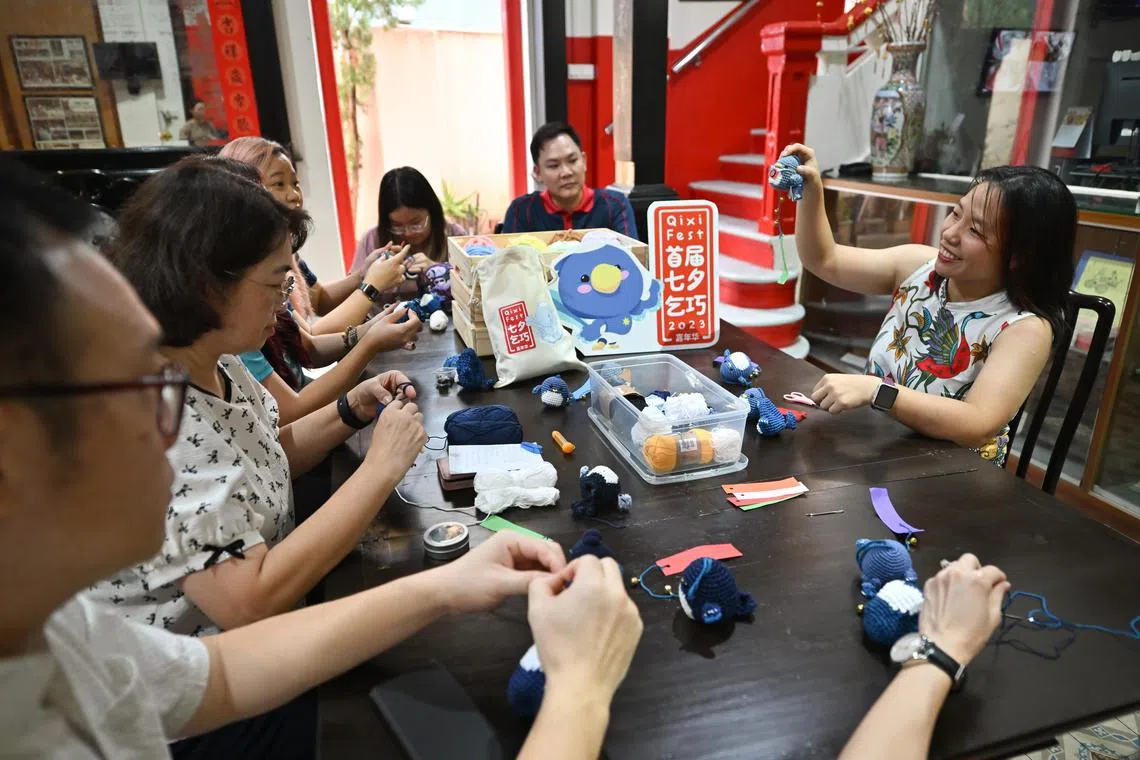‘Wish upon the stars’ festival returns to Chinatown after half a century
Sign up now: Get ST's newsletters delivered to your inbox

The Qixi festival will return to Chinatown from July to August, after an absence of more than 50 years.
ST PHOTO: RYAN CHIONG
SINGAPORE – The Qixi festival – marked by the age-old custom of wishing upon the stars – will return to Chinatown from July to August, after an absence of more than 50 years.
Spearheaded by festival director Lynn Wong together with clan associations and community partners in Chinatown, the seven-week Qixi Fest starting from July 7 will feature talks, workshops, exhibitions and tours, leading up to a mega carnival held along Smith Street on Aug 19 and 20.
Over 50 per cent of the programmes will be open to the public for free. The project is supported by the Singapore Tourism Board.
A magpie mascot named QiQi, or “seven seven” in Mandarin, has been created for the festival, which is also known as Double Seventh Festival, Seven Sisters Festival and Qiqiao Festival.
Associated with the legend about the brief reunion of the cowherd and the weaver fairy, it used to be one of the most important traditional Chinese festivals for women in Singapore.
Legend has it that magpies would form a bridge every seventh day of the seventh lunar month for the lovers separated across the Milky Way, fulfilling their wish to meet.
Since the Han Dynasty, it has been a custom to wish upon the stars on the day. Within Hokkien, Teochew and Cantonese households, women would lead younger family members in different “wish-granting” rituals.
The Qixi Festival had its heyday here in the 1930s to 1950s. Women would form over 100 “Milky Way associations” in Chinatown, displaying their exquisite handicrafts, which included miniatures of items like furniture and food. This attracted throngs of visitors throughout the night.
Celebrations that were grander than Chinese New Year were mostly held in the Keppel Harbour area. They lasted for several days, with elaborate offerings, auction banquets and opera performances by local and Hong Kong artistes.
The festival faded from public consciousness in the 1970s, even as places elsewhere in Asia like Hong Kong, Vietnam, South Korea and Japan continued to celebrate it.
Ms Wong, a heritage consultant and researcher, co-authored the book Reviving Qixi: Singapore’s Forgotten Seven Sisters Festival with heritage researcher Lee Kok Leong in 2022.
Written in both English and Chinese, it documents the rise and decline of the festival and provides suggestions on how to revive it.
Ms Wong, 34, who also chairs the youth committee of Cantonese clan association Kong Chow Wui Koon, said: ”During my research on the Qixi festival in Singapore, I had the privilege of interviewing over 50 people, most of whom were aged.
“They vividly shared personal stories, fond memories and suggestions on how the festival could be revived. I hope they get to witness the revival of this festival in their lifetime.”
She added: “Beyond documenting this significant but forgotten social history, I hope that future generations get to enjoy this beautiful festival and honour the legacy of our foremothers.”

The book Reviving Qixi: Singapore’s Forgotten Seven Sisters Festival by heritage researchers Lee Kok Leong (left) and Lynn Wong is written in English and Chinese.
PHOTO: ST FILE
There are three themes for the upcoming Qixi Fest.
First, it aims to celebrate the “(her)story” of female migrants and pioneers who brought the festival to Singapore in the 19th century.
There will be free talks, exhibitions and even boat tours along the Singapore River to find out more about the lives of Singapore’s “foremothers”.
Participants can also join workshops to make long-forgotten heritage food such as Majie chilli biscuits, Meizhou yam balls, and Tung Ann sweet potato balls.
The festival also hopes to revive the wish-upon-the-stars custom, and foster interest in arts and craft.
Participants can pen their wishes on paper magpies, and customise their own magpie crochet plushie to let their wishes take flight.

Festival director Lynn Wong (right) making crochet magpies with youth leaders from participating clans and volunteers from the crocheting community at Kong Chow Wui Koon on June 24.
ST PHOTO: LIM YAOHUI
There will be a display along Smith Street of 1,000 magpie crochet plushies, customised by 1,000 beneficiaries from less privileged backgrounds, on Aug 19 and 20.
Participants can also pick up a new skill or hone their talent in various crafts, including calligraphy and outdoor sketching.
The third theme is growing and sustaining the local heritage and arts ecosystem.
Besides the display of the clans’ artwork collection by veteran artists such as Xu Beihong and Lim Tze Peng, visitors will be treated to Qixi-inspired art pieces created by local artists.
The mega carnival on Smith Street will showcase a variety of the clans’ talents, such as performances by live bands and martial arts demonstrations by young children.
To find out more about Qixi Fest, visit www.qixifest.com


